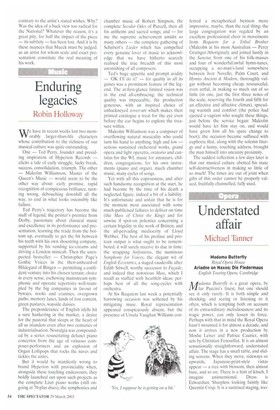Enduring legacies
Robin Holloway
We have in recent weeks lost two memorably larger-than-life characters whose contribution to the richness of our musical culture was quite outstanding.
One — Ted Perry, founder and presiding inspiration of Hyperion Records — elicits a tale of early struggle, lucky break, success, consolidation, triumph. The other — Malcolm Williamson, Master of the Queen's Music — would seem to be the other way about: early promise, rapid recognition of conspicuous brilliance, turning wrong, debouching downhill all the way, to end in what looks ostensibly like failure.
Ted Perry's trajectory has become the stuff of legend; the printer's preritice from Derby, passionate about classical music and excellence in its performance and presentation, learning the trade from the bottom up, eventually to get the bit between his teeth with his own shoestring company, supported by his vending ice-creams and driving a London minicab. Then the unexpected bestseller — Christopher Page's Gothic Voices in the then-unheard-of Hildegard of Bingen — permitting a confident venture into his chosen terrain: choice in every sense, eschewing mainstream symphonic and operatic repertoire well-trampled by the big companies in favour of byways, nooks and crannies, overgrown paths, memory lanes, lands of lost content, green pastures, wayside daisies.
The preponderance of English idylls hit a sure hankering in the market, a desire for the pastoral that sleeps at the heart of all us islanders even after two centuries of industrialisation. Nostalgia was compounded by a series resuscitating defunct piano concertos from the age of virtuoso composer-performers and an explosion of Organ Lollipops that rocks the naves and tickles the aisles.
But it would be manifestly wrong to brand Hyperion with provinciality when, alongside these touching endeavours, they boldly launched out upon such projects as the complete Liszt piano works (still ongoing at 70-plus discs), the symphonies and chamber music of Robert Simpson, the complete Secular Odes of Purcell, then all his anthems and sacred songs; and — for me the supreme achievement amidst so many others — the complete gathering of Schubert's Lieder which has compelled every genuine lover of music to acknowledge that we have hitherto scarcely realised the true breadth of this most astonishing of all composers.
Ted's huge appetite and prompt avidity —OK I'll do it!' — for quality in all its guises was a prominent feature of the legend. The at-first-glance limited vision was in the end all-embracing; the technical quality was impeccable, the production generous, with an inspired choice of unhackneyed cover-art which makes their printed catalogue a treat for the eye even before the ear begins to explore the treasure within.
Malcolm Williamson was a composer of overflowing natural musicality who could turn his hand to anything, high and low — serious sustained orchestral works, grand opera and light operetta, oratorio and cantatas for the WI, music for amateurs, children, congregations, for his own instruments (piano and organ), much chamber music, many cycles of songs.
Yet with all this copiousness, and after such handsome recognition at the start, he had become by the time of his death a neglected figure, indeed a bit of a liability. It's unfortunate and unfair that he is for the moment most associated with some much-publicised failures to deliver on time (the Mass of Christ the King) and for unwise if spot-on polemics concerning a certain frigidity in the work of Britten, and the all-pervading mediocrity of Lloyd Webber. The best of his profuse and protean output is what ought to be remembered; it will surely receive its due in time: the strapping Sinfonietta, the numinous Symphony for Voices, the elegant wit of English Eccentrics, a staged vaudeville after Edith Sitwell, worthy successor to Facade, and indeed that notorious Mass, which recall as stuffed with heartfelt ideas; perhaps best of all the song-cycles with orchestra.
At his Requiem last week a potentially harrowing occasion was softened by his mitigating muse. Royal representation appeared conspicuously absent, but the presence of Ursula Vaughan Williams con
ferrecl a metaphorical benison more impressive, maybe, than the real thing; the large congregation was regaled by an excellent professional choir in movements from Requiem for a Tribal Brother (Malcolm at his most Australian — Percy Grainger/Aboriginal); and joined lustily in the Sanctus from one of his folk-masses and four of wonderful/awful hymn-tunes, occupying a no-man's-land somewhere between Ivor Novello, Palm Court, and Hymns Ancient & Modern, thoroughly vulgar without becoming cheap, resourceful, even artful, in making so much out of so little (in one, just the first three notes of the scale, reserving the fourth and fifth for an effective and affective climax), spreading warmth and comfort (the police had ejected a vagrant who sought these things, just before the service began: Malcolm would have let him stay on, and would have given him all his spare change to boot); the occasion became suffused with euphoria that, along with the solemn liturgy and a funny, touching address, brought the man himself into uncanny proximity.
The saddest reflection a few days later is that our musical culture abetted his mate self-destructiveness in making so little of so much! The times are out of joint when gifts of this order cannot be properly valued, fruitfully channelled, fully used.








































































 Previous page
Previous page